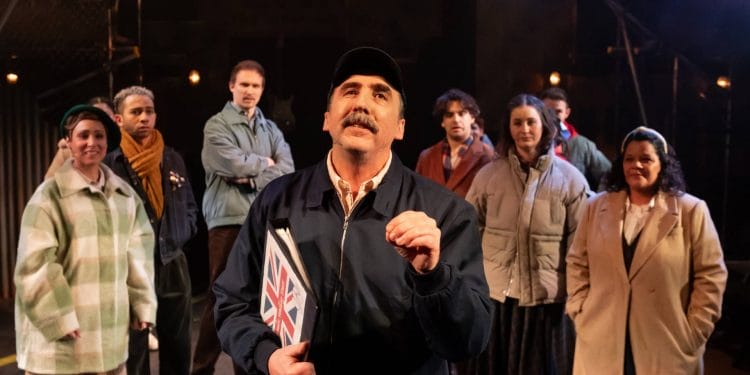 On 4th October 1936, hundreds of thousands of people from all faiths and backgrounds clashed with Oswald Mosely’s fascist Blackshirts (otherwise known as the British Union of Fascists, or BUF) in what became known as the Battle of Cable Street. With barricades made of furniture and little more than the strength of their convictions, the residents of London’s East End joined forces to keep the fascists out, joining hands to create a human shield, their battle cry of “They shall not pass!” ringing out. And it worked – the crowd was too strong, and the Blackshirts, despite having a police escort, had to turn back.
On 4th October 1936, hundreds of thousands of people from all faiths and backgrounds clashed with Oswald Mosely’s fascist Blackshirts (otherwise known as the British Union of Fascists, or BUF) in what became known as the Battle of Cable Street. With barricades made of furniture and little more than the strength of their convictions, the residents of London’s East End joined forces to keep the fascists out, joining hands to create a human shield, their battle cry of “They shall not pass!” ringing out. And it worked – the crowd was too strong, and the Blackshirts, despite having a police escort, had to turn back.
The Battle of Cable Street is remembered as a time when people showed how powerful it is to stand up for what’s right, and Tim Galvin and Alex Kanefsky’s new musical, Cable Street, tells the story of that time through the eyes of three young people and their families – Sammy (Joshua Ginsberg), a Jewish man, Mairead (Sha Dessi), an Irish Catholic woman and communist, and Ron (Danny Colligan), an English man who feels disenfranchised and who joins the BUF.
There is a lot to recommend about Cable Street. The score is wonderful, with many different genres of music coming together, just like the diverse people the story represents. You have rap, folk songs, rock numbers, and ballads, and they all mix together to tell the story, pushing the narrative onwards. Some songs are stronger than others, with the exceptional “No Pasaran!” standing head and shoulders above the rest. That’s the song that ends the first act, with the barricades being built and the community coming together, and it’s the one that sticks with you for the longest time.
The performances are also strong, with Sha Dessi as Mairead, the strong-willed young woman who wants to fight for a better world, and Joshua Ginsburg as Sammy, the cheeky and charming young man who wants to better himself standing out in a cast of superb talent.
There are some less positive elements as well, however – the Blackshirts are painted as almost pantomime villains with a comedic side to them that just doesn’t sit right with the subject matter; even when they’re at their most evil in the story, they still come across as bumbling buffoons rather than any serious threat, and that undermines a lot of the power of the true story.
There are also times when the story lags, particularly in the second act after the battle has taken place and there’s still some loose ends to tie up. And they do all tie up in a (mostly – there is one rather devastating piece of news that comes out of the blue and that actually brought a brief tear to my eye) happily ever after kind of way, which again, just doesn’t quite work.
Conversely, there are times when the story speeds up a little too fast, skipping over some important character development that would make motivations clearer. And when it comes to the framing device – a walking tour of London’s East End set in 2024, where Mairead’s daughter and Sammy’s nephew coincidentally meet and discuss the past – there’s a lot of on the nose exposition that really is a case of telling rather than showing.
Cable Street tells an important story, and for the most part, it does so pretty well. Yes, it is reminiscent of Operation Mincemeat in parts, and there’s a good smattering of Les Mis in there too (perhaps inevitable when you consider that it’s the story of normal people building barricades to fight against an oppressive enemy), and unfortunately it doesn’t quite live up to those heady heights, but just because Cable Street is a little rough around the edges right now, that doesn’t mean it doesn’t have the potential to become better – it, like the street it’s named for, has got a strong foundation.

















